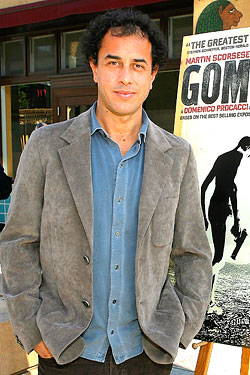
Matteo Garrone, jolly young Italian director of the relentlessly bleak gangster movie Gomorrah (which opens tonight), isn’t going to win any Oscars on February 22. Even with the backing of Martin Scorsese, who introduced it at the New York Film Festival, the picture didn’t make the cut for Best Foreign Language Film. But it has caused a sensation in Italy as big as any of the Godfather movies ever did: It’s based on a nonfiction exposé of organized crime outside of Naples that was already hotly debated there; the author, Roberto Saviano, is in hiding because of a mafia fatwa. The heavily accented Garrone didn’t seem too worried himself, eyes twinkling in between cell-phone calls at the bar at the Hudson hotel, about as far from the nihilistic precincts of Camorra as one could imagine. The movie, he says, was in the end about “The confusion between fiction and reality.”
Were you aware of the book’s controversy when you started working on the film?
No. When I started to work on this project, summer 2006, the book was just published about two weeks. So nobody knew about the book, it was not a bestseller. And Saviano was not under protection.
Did you think the book was exaggerated at first?
Yeah, I thought [it] could be a science-fiction movie, from the book.
Is that a typical reaction to the movie also?
There are many reactions, but everybody is surprised. The people that maybe do not go very often to the cinema, can say, “Oh, it’s just a documentary.” Because it means that I have done good work, because I want to show the movie like it is real. But it’s not. People from Naples [are] very worried, because [of] the problem that the movie can have for tourism.
Did it make it exotic, even to Italians?
When the movie came out in Italy, it came out with subtitles in Italian — because they spoke in so strict a dialect … I met a lot of people from the center of Naples that were really surprised by the reality of the movie. I come from Rome, and it was a surprise to meet people that in 2008 in Italy live in an atmosphere of war. People of my age, younger than me, that know everything about the guns, about the way how to shoot. I shot the movie like a documentary, like a reportage of war. But it isn’t.
How did you change the book?
The movie is not an imitation of the book, but it’s an interpretation. In the book, the man who brings money to the family of the people of the system, in the book [takes up] one or two pages. And we developed his story.
Everybody talks about how you sought to de-glamorize the mafia movie.
I thought it was the possibility to rewrite, from a different point of view, the [imagination] of the criminal in cinema. But all the criminals that I [have] met love cinema. They love the masterpieces of Coppola.
Like the two young wannabe gangsters in the movie, who quote from Scarface.
They are like Don Quixote and Sancho Panza. They confuse reality and fiction completely. For them, it’s very important, the freedom. They are two anarchists.
That brutalist housing complex they live in is so important to the film, but those two seem to always be outside of it — like that scene where they were shooting guns in the marsh in their underwear.
The building is like Blade Runner. It’s like a labyrinth. It was important, this claustrophobic idea — you’re lost inside it.
Is there political controversy about the film?
The reaction of the government has been to declare war to the Camorra, and they brought harm to Naples.
Because of the movie?
For the book and for the movie together, of course.
How amazing to have that power.
It’s such a responsibility, because I don’t know if the things will change [for the] better because a lot of Camorrists now are in jail, but I haven’t seen many politicians in jail. And the Camorrists worked with politicals. So I don’t know if … the government will be able to work, come inside, and really change something. So I’m curious to see what will change.
The tribal-loyalty aspect of it made me think of Iraq.
That was the most important — that’s what Scorsese said when we presented the movie. He said exactly that, that there is no way out. The strongest part of the movie is the fact that there is no hope. There is a fight to survive. There is a lot of humanity in the characters. But you can’t find hope there.
Do you wish you could have done more of the book’s characters?
I wanted to make the movie for television — ten stories. That would be a real al fresco of the book. But of course, the producer wanted to make a movie for cinema. So I settled for five, but I regret [that], because there were other stories [that were] very interesting.
You could make it into a series for HBO.
Never go back on the scene of the crime. [My next movie] will be, I hope, very light and full of humor, a comedy.




